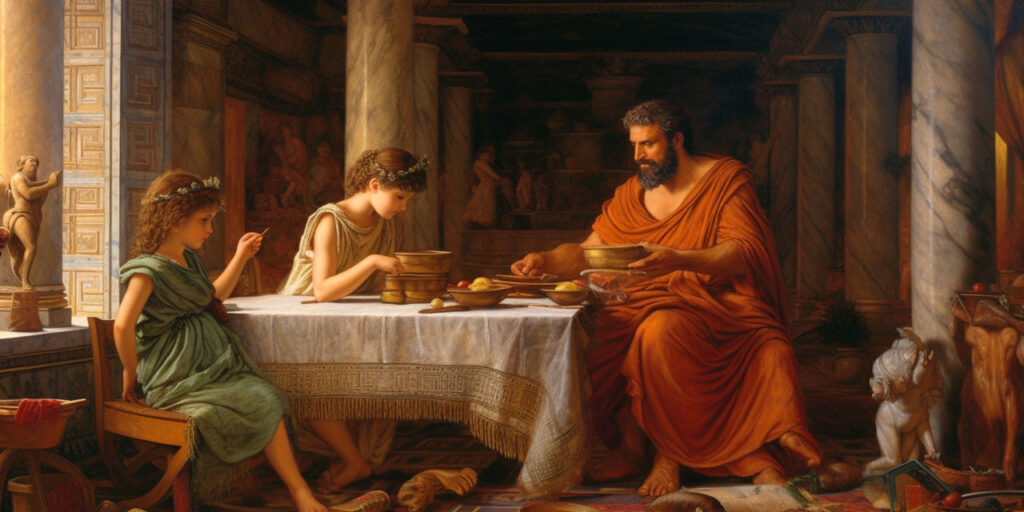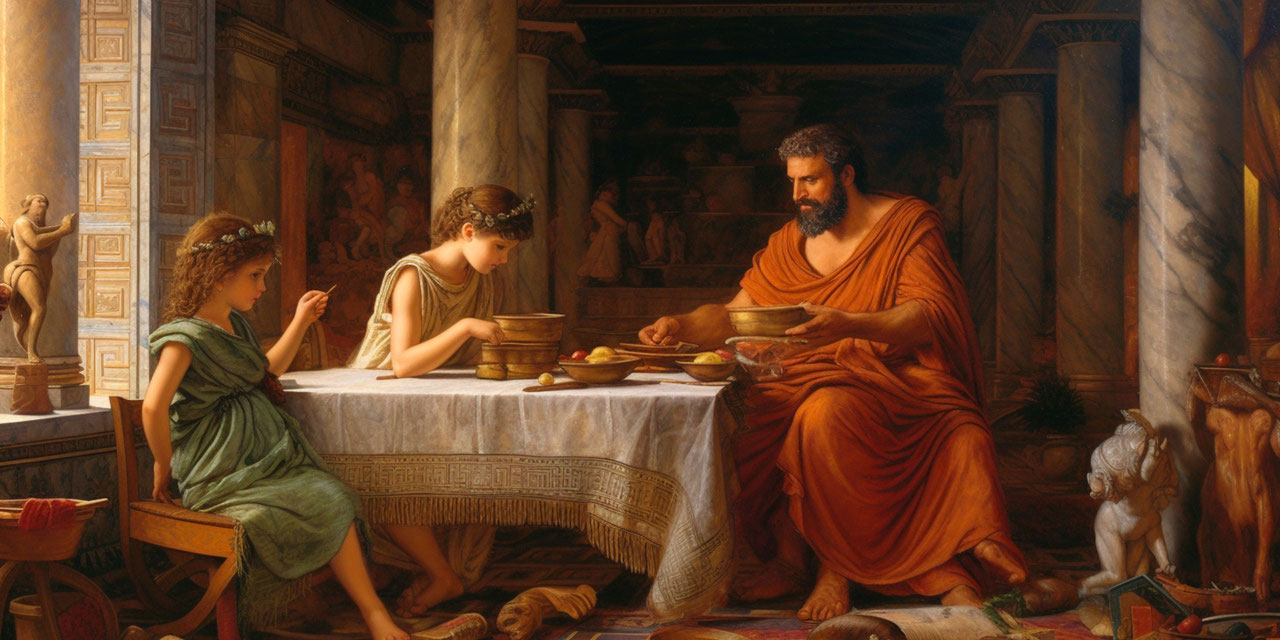Considering the book called “Oeconomicus”, we will focus mainly on what interests us in terms of revealing Xenophon’s ethical-political and philosophical outlook, and in addition we will consider a very atypical work “On Income”, but first — “Oeconomicus”. Philosophical elements appear here almost immediately. Speaking by the mouth of Socrates’ disciple Critobulus, we are advised to evaluate things as “gain” and “loss” through their benefit and harm, and then Xenophontes introduces a sensualistic criterion. Then he (Socrates) shows that people can be slaves of the passions, and this is worse than physical slavery and clearly harmful to the economy. But the hero, who proves himself to be an honorable man, is not afraid of this danger. Nevertheless, even though he is 100 times richer than Socrates, with his high position in Athens these funds are not enough, and he wants to learn how to better manage the household. Socrates, who has no farm and therefore has no experience, cannot ostensibly help in any way, but will still try to analyze what he has observed from others.
In essence, he advises being a diligent worker. Work harder — better results. On the other hand, we are clearly advised to moderate our consumption, so that in the end, income exceeds consumption. Simply put, almost from the very beginning, the banal “Protestant” ethic is proposed. The house should be organized strictly according to feng shui, so that all things lie in their places, you need order, discipline, strictness, Sparta. But here he introduces the family, and assigns to the husband the task of a provider, and to the wife… an expendable. And the increase in wealth depends only on the wife. If she is bad, there will be ruin, if she is good, then regardless of the level of her husband’s income, she will be able to leave a profit (it does not matter how much, the main thing is that the budget was in the plus). Thus Xenophont removes from the man all responsibility for the household and shifts it to the woman. As a compensation he only adds that in some cases the husband himself is guilty of bad education of the wife (although it is assumed that the wife is simply unlearned and stubborn), but his analogy is at the level of:
“If the sheep is bad, we usually blame the shepherd, and if the horse has faults, we blame the rider; as for the woman…”
It is clear that Xenophon’s «Oeconomicus» is a typical philistine guide in the spirit of conservatism, both ethical and economic. Further it will only be confirmed by a number of examples. For example, it says here that craftsmanship is harmful to body and soul, and in general does not befit a noble man (a false meme, which we challenged in the article “Marx does not understand the Greeks”). And here he also extols farming, the Spartan way of life and condemns the building of defensive walls that create weak and cowardly citizens.
«Shall we be ashamed to follow the example of the Persian king? He, it is said, considers one of the noblest and most necessary occupations to be agriculture and the art of war, and takes extreme care of both.»
Xenophontes (through Socrates) uses the state structure of Persia as an example of good economic management at the level of a whole country, but it can also be used by analogy from individual farms. And it is desirable to do farming literally, with your own hands, to be a strong warrior and a real man. A separate block is the instruction “how to bring up a wife properly”, which is reduced to the fact that “God has adapted: the nature of woman for domestic labor and care, and the nature of man — for external”, and to the standard kitchen-children-home, sit and stay down. However, for that time this was the norm for “liberal” thinkers as well; but in the case of Xenophonte, it complements the image of a conservative quite well. Like Prudon in “Pornocracy,” he paints a world where women and men complement each other’s shortcomings. And Xenophontes’ basic analogy for how one should act in domestic matters, just like the socialists of the future, connects with the bees in the hive.
Basically, he teaches his wife the same things that were discussed above — “Protestant” ethics, order and discipline. His house is not decorated on principle (in the dialog “Gieron” he is still fundamentally against spices for food), and his wife also does not use cosmetics and beautiful things on principle. Everything must be strict and primitive, as in Sparta, justifying it with the advantages of natural over artificial (roughly like the logic of those fighting against GMOs and for the Soviet GOST).

In addition, Xenophontus tries to describe how to conduct business in agriculture, advises to choose a slave as a manager, who should be taught everything that you know yourself, and by his good disposition almost bring him into the family circle, so that he could perfectly cope with affairs in your absence (such “liberalism” with regard to managing slaves is also found in Roman manuals on agriculture, and to some extent it applies to managed slaves as well). In principle, Xenophontus is even less strict here than the Roman Cato, which is even somewhat surprising. Contrary to all the scaremongering of Marxism, slaves here are called “human beings.” But the analogies he uses to educate women, slaves, and children (and not always with the intent to demean) are analogies to animal training. On the one hand, this is crude Spartan conservatism, but on the other hand, he is not ashamed to put man and animal on the same level, although recognizing the differences between humans. Against the background of Christian morality, even of 21st century people, this could even be seen as an unprecedented level of liberalism.
With all these means, which I myself apply, expecting to make people more obedient, I teach those whom I want to put in charge, and I also help them with this: clothes and shoes, which I have to give to the workers, I do not make all the same, but some worse, others better, so that it is possible to give to a good worker as a reward what is better, and to a bad one what is worse. It seems to me, Socrates,” he remarked, ”good workers have a feeling of disappointment when they see that the work is done by them and yet the same reward is given to those who are not willing to bear the labor or the danger at the right moment. That is why I myself by no means equalize the rewards of good workers with bad ones and praise the manager when he distributes the best things to the most deserving.
It is not a fact that we are talking about slaves here (although it is hinted at by the fact that he dresses and shoes them himself, and other fragments where “workers” need supervisors, etc.), but this is not only a bourgeois principle of competition and fair remuneration for labor, but also another example of the “liberal” ideal. And then there are purely technical sections about soil properties, fertilizers, sowing, harvesting, etc. As a result, we see not even the most rigid for antiquity guidelines on household affairs, but clearly different from the recommendations of the Sophists, who were not opponents of walls, were not enemies of craft and trade, were not supporters of aristocracy and farmers, and preached neither moderation nor accumulation of capital (see “Anonymus Iamblichi”, “Dissoi logoi” and in general our cycle on the philosophy of the Sophists).
On income, or Xenophonte as a liberal
In his work “On Revenue”, Xenophontes asks whether Athens can maintain its luxurious standard of living without plundering the subordinate cities of its “allies”, purely on its own, in a mode of autarky. And will try to prove that yes, they can. After all, Athens is in a great climate zone and most importantly, has silver mines.
One might also think that the city of Athenians is not without purpose located near the center of Hellas and even the entire universe.
As we said in the article “Marxism-Xenophonticism”, this work of Xenophon is designed to offer an ideal plan to overcome the crisis. But in reality this plan was not put into action. Therefore, Soviet reconstructions of the Athenian economy based on this work are obviously wrong. So, according to this ideal plan, Athens needed to seriously expand the rights of metics (non-citizens), keeping a special tax for them, which would have brought serious revenues. He proposes state patronage for merchants and shipbuilders. He suggests reducing bureaucracy to make business easier and make Athens an attractive center for trade. He also realizes that it takes large investments to establish large enterprises. But he believes that if the Athenians could chip in for large military campaigns, they can chip in for large businesses, so that they can receive a steady income as shareholders (as opposed to a net loss on the army). And even after that he proposes that strange utopian financial “pyramid” of buying slaves for the mines, as discussed in the article about Marx. From the above, it is clear that Xenophontus prefers to invest in business instead of subsidizing war. But he goes even further in terms of praising peace policy:
It is obvious that, for all revenues to flow in abundance, peace is necessary. But in such a case, should not the office of peace keepers be established? After all, the election of such officials would encourage all people to come to our city more willingly and in greater numbers. If anyone thinks that by constantly pursuing a peaceful policy the state will become less strong, less glorious and less influential in Hellas, I must say that he is mistaken: For it is not without reason that it is said that the happiest states are those which live longest in peace; and of all states Athens has the greatest capacity for development in times of peace.
Most of these are very liberal measures, as for a conservative, although they do concern public (not private) investment and public revenues. True here as well:
You see, in the same way, private individuals, by banding together in companies and sharing all fortunes and failures with each other, are less exposed to danger in this risky enterprise. And of course you must not be afraid that with this method of mine development the State will embarrass private individuals or, on the contrary, that private individuals will embarrass the State.
This is far from the first time that Xenophontes has written things that don’t fit the standard description of him as a hardened reactionary and fan of Sparta (though all of that is certainly true as well). Including economic issues, we have already seen in the work “Cyropaedia” how he proposed an international confederation based on economic grounds, and in the work “Hiero” he proposed to promote competition as much as possible for the effective development of the city’s economy.

Добавить комментарий